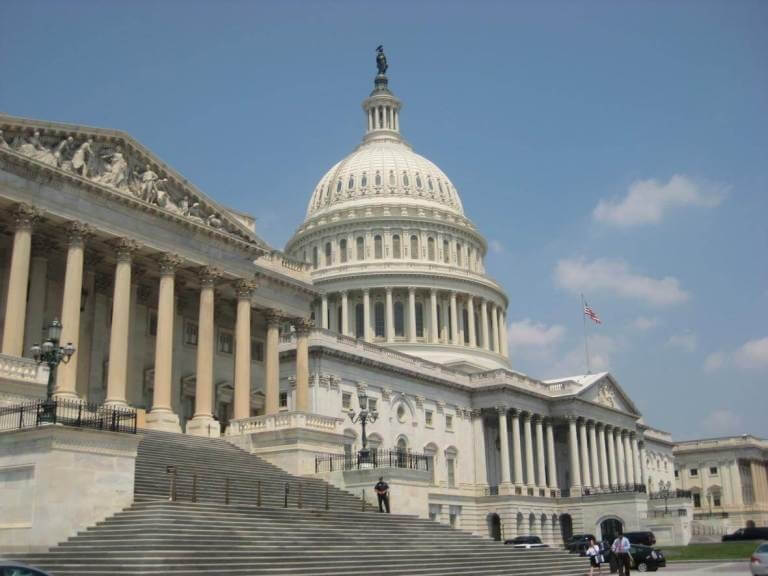Md. Leaders Beseech Congress for More Local Government Funding

As the COVID-19 crisis deepens with no clear end in sight, city and county lawmakers are scrambling to pull together their budgets, anticipating major losses in revenue just around the corner.
They’re hoping that the next round of federal CARES Act funding to be taken up in the Senate this week can stop some of the bleeding.
“I submitted my budget to the County Council on Friday … and our projections for revenue dropped $63 million in a period of three weeks,” Anne Arundel County Executive Steuart Pittman (D) said on a virtual conference with state, local and federal lawmakers Monday morning.
Pittman told fellow lawmakers that the budget he sent along will disrupt progress made in the county’s ability to provide social services.
“It’s true that that local government, if we can’t provide services, our people are really going to be hurting,” he said.
Pittman described calls for local governments to file for bankruptcy as “absurd.”
“People can’t, can’t live through this, this pandemic, if that were to happen,” he said. “We’re the ones that have the health departments that are, that are doing the contact tracing, testing, and we, we have to have some resources.”
Montgomery County Executive Marc B. Elrich (D) said that he had to submit his county budget on March 16.
“So I’m submitting a budget that was developed during the height of the longest economic boom we’ve ever had,” he explained. “And all of a sudden, all that money is in jeopardy.”
Elrich said that, to date, the county has put up nearly $27 million in assistance for its residents.
He also said the county is looking at a revenue loss of up to $250 million.
“And it’s worse than that,” Elrich said, explaining that when small businesses shutter, property owners can file for reductions in their property taxes that account for that gap in their rental revenue.
Elrich is expecting a “wave of filings.”
“That is going to be a wave that we haven’t even calculated fully into our losses,” he said. “But that is a serious loss. It lasts for years, and it’s going to really impair our ability to do services.“
Elrich said that affordable housing in his county may also be in jeopardy if providers don’t receive $40 million to pay mortgages on their properties.
“This is not something that a county can just turn on a dime and say, ‘Well, we’ll just take care of it. We’ll write the check,’ he explained. “We really need federal money.”
Howard County Executive Calvin S. Ball (D) said that the county has funded $6 million in COVID-19 relief efforts thus far, and is expecting to see around $35 million in revenue losses.
This is a crushing blow when compared to the nearly $25 million in annual revenue increases the county has seen in the last few years, he said.
Ball applauded the collaborative efforts between Maryland’s congressional delegation and state and local officials but noted a “major challenge” in how funds may be accessed by cities and counties with smaller populations under the last round of CARES Act funding.
A clause in the last stimulus package allowed five of Maryland’s most densely populated counties to directly receive between $100 million and $150 million provided under state and localization funds, while the rest of the state’s counties had “to go through a much more rigorous process to get access to that funding,” Ball said.
“That leads county executives and mayors across Maryland and across our country not being able to fight this terrible pandemic with all the tools possible,” he said.
An anticipated fight
U.S. Sen. Chris Van Hollen (D-Md.) stressed on the call that while there needs to be flexibility on how the next round of federal stimulus money is spent, the funding that counties have received thus far should be flexible and easily accessible, too.
He said he was happy to have fought for funding for state and local governments in the stimulus package that passed early last month, but acknowledged that it was “just a down payment.”
“We know that all of you are experiencing incredible pressure on your budgets, having to make difficult decisions,” Van Hollen said. “That’s why we need another round.”
U.S. Sen. Benjamin L. Cardin (D-Md.) said that accounting for lost revenue must be a top-priority in the next iteration of the CARES Package, which he said that the Senate will begin looking at Monday.
“We’ve got to get you help for your revenue loss. We didn’t do that in the last round. That’s got to be our top priority as we look at what we can do next,” he said.
“Sometimes we take fire and police and sanitation for granted and assume it’s always going to be there. I think, unfortunately, that’s what our president tends to think also,” Rep.-elect Kweisi Mfume (D-Md.) said. “Those things require funding. Those are real people.”
Mfume will rejoin the Maryland congressional delegation on Capitol Hill following a sweeping win in the 7th District special election last week. He will be formally sworn in on Tuesday.
Mfume said that local governments “must have flexibility” to move money that he says will come through the next stimulus package around to areas where it’s most needed, adding that after seeing the disparate impact of the virus on communities of color he’s hoping to find a way to help local leadership bring aid to the hardest-hit communities while still accounting for the necessary functions of government.
Rep. C.A. Dutch Ruppersberger (D), a tenured politician at both the federal and local levels, said that he wishes his colleagues on Capitol Hill paid more mind to local leadership when crafting legislation, and that moving forward with a new stimulus package without considering local government needs will “affect the basics” of public safety and education.
“I’ve always thought that if more members of Congress could serve in local government or state government, that Congress would be a lot better off, because that’s where the rubber meets the road, where we have to balance our budgets, and where you really know what’s happening,” he said.
Ruppersberger was a member of the Baltimore County Council from 1985 to 1994 before serving as the county executive from 1994 to 2002.
A bipartisan call to arms
Those who legislate from Washington, D.C., aren’t the only one’s fighting on behalf of local governments.
Maryland House Speaker Adrienne A. Jones (D-Baltimore County) and Senate President Bill Ferguson (D-Baltimore City) signed on to a national letter to House Majority Leader Nancy Pelosi (D-Calif.) and Senate Majority Leader Mitch McConnell (R-Ky.) on Monday, asking that Congress offer “additional, flexible funding” to local and state governments that are seeing impressive budget deficiencies in response to the COVID-19 pandemic.
“Our revenues from industry and tax have decreased drastically while our costs have skyrocketed,” they wrote. “Many of our states went from having budget surpluses to the potential loss of billions in state revenue.”
Jones and Ferguson were joined by 18 presiding officers on both sides of the aisle, representing state legislatures from across the U.S. who signed the letter.
“The scale of unemployment and lost revenues spans the entire country, regardless of ideological allegiances or geographic alignment,” the letter read.
In the letter, lawmakers state that the money allotted to states in the CARES Act passed in early April was “critical” in assisting governments seeking to meet their growing needs, but that they need to ensure that money will continue to flow to the most vulnerable.
According to a survey conducted by the National League of Cities and the Conference of Mayors cited in the letter, community leaders across the country say that they “will be forced to cut critical public services and reduce their workforces: nearly a third anticipate furloughing employees; a quarter anticipate lay-offs; more than half anticipate funding cuts for police and more than one-third expect cuts for firefighters and EMTs.”
“The Federal Government remains the backstop to this economic slide and can prevent further catastrophic damage,” they wrote.




 Creative Commons Attribution
Creative Commons Attribution